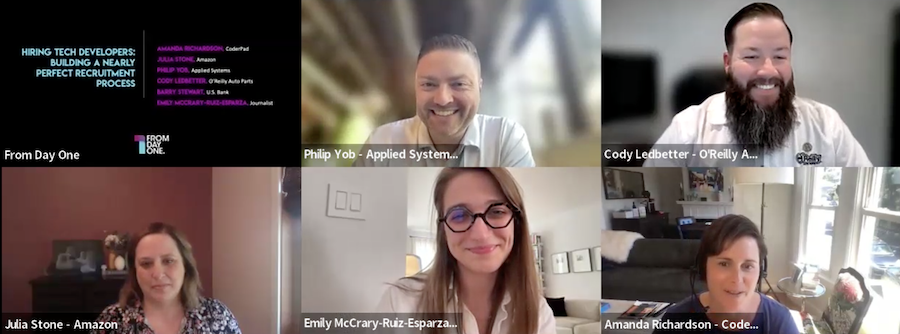How to Improve the Recruiting Process for Technical Talent


“There’s a record number of candidates applying for roles. I think it takes a good, solid recruiting strategy to ensure inclusivity practices are followed,” said Cody Ledbetter, senior technical recruiter at O’Reilly Auto Parts, during a From Day One panel discussion on how to build an exceptional recruitment process.
According to Amanda Richardson, CEO at technical interview platform CoderPad, this increase in application volume is forcing recruiters to make changes. She observes companies abandoning loosely planned, informal interviews for more conscientious decision-making. “It’s nice to see companies being a little more organized, disciplined, and clear in their hiring processes,” she said.
Richardson is encouraged by candidate assessments designed to evaluate the skills most relevant to the job–rather than arbitrary pop quizzes, for instance–and happy with the return of the live interview checking both hard and soft skills.
It is the confluence of mutually beneficial tech tools and human understanding, said panelists, that is changing the way employers are able to recruit and vet incoming tech talent.
Using the Latest in HR Tech to Improve the Hiring Process
Artificial intelligence has talent acquisition professionals excited for its possibilities and likewise trepidation about its power. And whether they’re prepared or not, AI has arrived in HR technology. So, what are the implications for the hiring process?

“I do think that [AI] will make the recruitment process significantly more efficient, in terms of elimination of manual tasks,” said Phil Yob, senior director of talent acquisition at insurance tech company Applied Systems. “I don’t think that at this point it’s solving for the personal interaction you get from working with TA or HR in the interview process. Despite all the good work they can do from automated messaging, face-to-face interaction and the human touch element are big pieces.”
Further, panelists urged recruiting teams to be vigilant about the quality of the AI tools they’re using. Ultimately, the TA teams and hiring managers who use them will be responsible for whatever decisions are made. “It’s our job to understand what it’s doing and what it’s weeding out,” said Julia Stone, head of recruiting for eCommerce infrastructure services at Amazon.
Assessing Great Candidates
Faced with mountains of applications, recruiters are figuring out the most efficient, effective, and scalable ways of evaluating the qualifications of those candidates. Ledbetter’s rule of thumb is that “the recruitment process should be commensurate with the level of technicality for the role.” Don’t exhaust candidates with overly complex or back-to-back assessments. By avoiding burdensome technical assessments–and limiting questions only to those most relevant to the role–employers can build trusting relationships with top developers.
Given the tech industry’s reputation for being less than diverse, Richardson said she’s encouraged by new skills-based hiring practices. “I can assure you that [tech] is still lacking in diversity, but I credit people teams with doing everything they can to really fight against it. I do think the opportunities are around finding a way to assess candidates that’s different from just looking for logos or keywords.”
Regarding the legitimacy and consistency of recommendations made by interviewers themselves, the panelists encouraged rigorous preparation. “It’s very important to establish what each person is assessing for,” Amazon’s Stone explained. “By putting more rigor in that structure before you’re going in, you can avoid some of that groupthink.”
There may be room for more equity in the hiring process when it comes to hiring candidates from within or without the organization. Yob noted that Applied Systems makes a point of operating consistently, whether the candidate is internal or external. “We’ll give a little credence to their having been a part of the culture, but I think the best thing we can do is to motivate internally by treating them the same and continue to move them through that process to make sure we’re getting the best possible person.”
Skills matter, but so does the mode of working. Employers that have called their workers back to the office are returning to the in-person interviews, the panelists said, but that won’t be necessary for everyone. The best way to evaluate a candidate is the context in which they’ll be working. “Some companies give a Slack interview–or on Teams, whatever your product is,” said Richardson. “If you can’t communicate effectively on that channel, you probably aren’t going to be successful in a remote world.” The interview format matters, she said. “Are they going to be proficient not only in the skills but in the environment, too?”
Editor's note: From Day One thanks our partner, CoderPad, for sponsoring this webinar.
Emily McCrary-Ruiz-Esparza is a freelance journalist and From Day One contributing editor who writes about work, the job market, and women’s experiences in the workplace. Her work has appeared in the Economist, the BBC, The Washington Post, Quartz, Fast Company, and Digiday’s Worklife.
The From Day One Newsletter is a monthly roundup of articles, features, and editorials on innovative ways for companies to forge stronger relationships with their employees, customers, and communities.